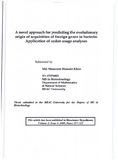A novel approach for predicting the evolutionary origin of acquisition of foreign genes in bacteria: application of codon usage analyses

View/Open
Date
2009Publisher
BRAC UniversityAuthor
Khan, Md. Moazzem HossainMetadata
Show full item recordAbstract
Lysogenic bacteriophages, are considered as a major player for the introduction
of foreign genes into bacterial strains. At the time of introduction foreign genes
do not fit well into the translation system of the recipient host bacterium as they
tend to retain the characteristics of the donor bacteriophages from which it has
been transferred. Consequently foreign genes are poorly transcribed at the early
phase of their evolution within the host bacterium. This is largely due to the
difference in the codon usage pattern between the horizontally transferred genes
and the host bacterium. In this study we present detail analyses of various
parameters of the codon usages such as codon adaptation index (CAI), mean
difference (MD) of the relative adaptiveness, synonymous substitution rate (SSR)
of six different phage encoded toxin genes (cholera toxin, shiga toxin, diphtheria
toxin, neurotoxin C1, enterotoxin type A and cytotoxin) and proposed
conceptual relationship between the evolutionary time of acquisition of the
foreign genes and the selected set of parameters of the codon usage. On the basis
of the observed data we hypothesize that CAI, MD and SSR of the phage
encoded toxin genes are correlated with the evolutionary time of their
acquisition and developed a novel approach based on the analyses of these
parameters, that can be used to predict the evolutionary time of their acquisition
by the corresponding host bacterium.
